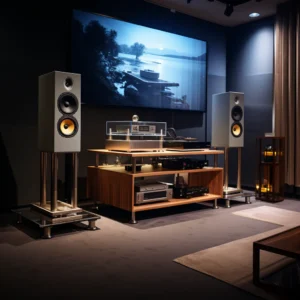
Speaker wire is a fundamental component in setting up a high-quality audio system. When you choose the right speaker wire, you’re ensuring that your speakers deliver the best sound possible. Understanding how speaker works and why it’s important can help you make better choices for your audio setup.
Speaker wire might seem like a small part of your audio system, but it plays a big role in how your speakers perform. Using the correct type and gauge of speaker can make a noticeable difference in sound clarity and overall performance. In this guide, we’ll explore everything you need to know about speaker to enhance your listening experience.
What Is Speaker Wire and Why Does It Matter
Speaker wire is a special type of wire used to connect your speakers to your audio system. It’s important because it helps send the sound signals from your amplifier or receiver to your speakers. The better the wire, the clearer and more detailed your sound will be.
Choosing the right speaker can make a big difference in how your music or movies sound. Good speaker ensures that all the details in your audio come through clearly. Poor-quality wire might cause sound problems or reduce the quality of your listening experience.
Speaker comes in different sizes and materials. Some are designed for better performance and durability. Knowing what type to use can help you get the best sound possible from your system. It’s not just about having any wire; it’s about having the right wire for your setup.
Choosing the Right Speaker Wire for Your Audio System
When picking out speaker wire, it’s important to consider the gauge, or thickness, of the wire. Thicker wires can carry more signal, which is great for long distances. For most home setups, 16-gauge wire is a good choice because it offers a balance of performance and cost.
Another thing to think about is the material of the wire. Copper is a popular choice because it’s a good conductor of electricity. Some wires are coated to protect them from damage, which can be useful if the wires are exposed or in a high-traffic area.
Tips for Choosing Speaker Wire:
- Gauge: Choose a thickness that fits your distance needs.
- Material: Look for copper wire for the best performance.
- Insulation: Consider wires with good insulation for added protection.
Choosing the right wire helps make sure your audio system performs at its best. It’s worth spending some time to get it right so you can enjoy great sound quality.
How to Properly Connect Speaker Wire for Optimal Sound
Properly connecting your speaker wire is crucial for the best sound quality. First, make sure your audio system is turned off before you start connecting wires. This helps prevent any electrical issues or damage to your equipment.
Steps for Connecting Speaker Wire:
- Strip the Wires: Carefully remove a small section of insulation from the ends of the wire.
- Connect to Terminals: Insert the wire ends into the terminals on your speakers and receiver.
- Secure the Wires: Make sure the wires are tightly connected to avoid any loose connections.
By following these steps, you can ensure that your wire connections are solid and that your sound quality is as good as possible. Good connections help your system perform better and can prevent sound issues.
Speaker Wire Gauge Explained: Finding the Best Fit
The gauge of speaker wire refers to its thickness. A lower gauge number means a thicker wire, which can carry more signal and is often better for long distances. For most home audio systems, 16-gauge wire is suitable, but you might need a thicker wire for very long runs.
Why Gauge Matters:
- Long Distances: Thicker wires are better for longer distances because they lose less signal.
- Speaker Impedance: Check your speakers’ impedance to choose the right wire gauge.
- System Power: Higher power systems may benefit from thicker wires to handle the load.
Choosing the correct gauge of wire helps ensure that your audio system performs optimally. It’s important to match the wire gauge with your specific setup needs for the best results.
Common Speaker Wire Mistakes and How to Avoid Them
When setting up your speaker wire, there are a few common mistakes people often make. One mistake is using the wrong gauge of wire. If the wire is too thin, it can’t handle the signal properly, which can lead to poor sound quality.
Common Mistakes to Avoid:
- Using the Wrong Gauge: Always choose a gauge that suits your setup.
- Incorrect Connections: Make sure the wires are securely attached to the terminals.
- Ignoring Insulation: Check that the insulation is intact to avoid damage.
Another mistake is not paying attention to the wire’s insulation. If the insulation is damaged, it can lead to short circuits or degraded sound quality. Ensuring that your speaker wire is properly insulated and securely connected will help you get the best performance from your audio system.
How Speaker Wire Quality Affects Your Home Audio Setup

The quality of your speaker wire can have a big impact on how your audio system sounds. High-quality wire helps ensure that sound signals are transmitted clearly and without interference. This means you’ll get better sound from your speakers.
Benefits of High-Quality Speaker Wire:
- Clearer Sound: Good wire reduces signal loss, resulting in better sound clarity.
- Durability: High-quality wire is more durable and less likely to break.
- Better Performance: It helps your audio system perform at its best.
Investing in high-quality speaker wire can make a noticeable difference in your home audio setup. It’s worth considering if you want to improve the overall sound experience in your home.
Tips for Maintaining and Replacing Your Speaker Wire
To keep your wire in good condition, regular maintenance is important. Check the wires periodically for any signs of wear or damage. If you notice any issues, replacing the wire promptly can prevent further problems and ensure continued good sound quality.
Maintenance Tips:
- Inspect Regularly: Look for signs of wear or damage on the wire.
- Keep It Clean: Dust and dirt can affect performance, so keep the wires clean.
- Replace When Needed: If the wire is damaged, replace it to maintain sound quality.
Maintaining your speaker wire helps keep your audio system in top shape. Proper care and timely replacement of worn-out wires will help you enjoy clear and high-quality sound for a long time.
Conclusion
Choosing and maintaining the right speaker wire is key to enjoying great sound from your audio system. Whether you’re picking the right gauge, connecting the wires correctly, or avoiding common mistakes, every step helps improve your listening experience. High-quality speaker ensures that your music and movies sound their best, making every moment more enjoyable.
Remember, taking care of your wire by checking it regularly and replacing it when needed can make a big difference. Good speaker wire might seem like a small detail, but it has a big impact on how well your audio system performs. So, make sure to get the right wire and keep it in good shape for the best sound possible.





